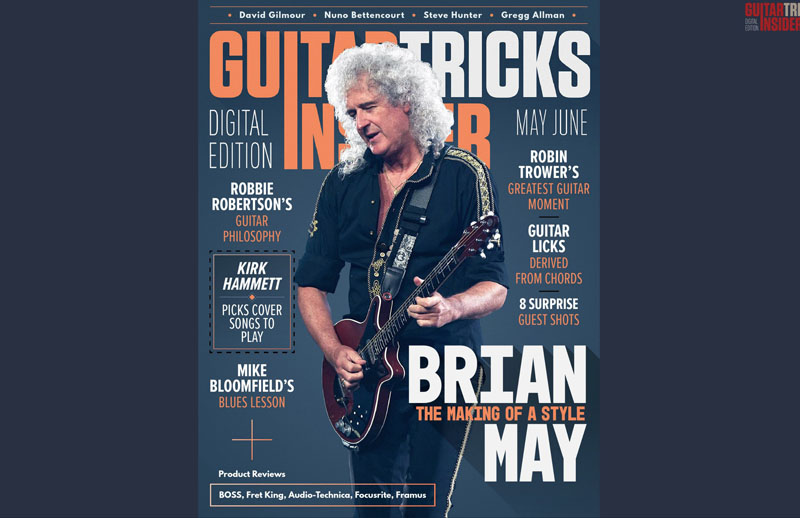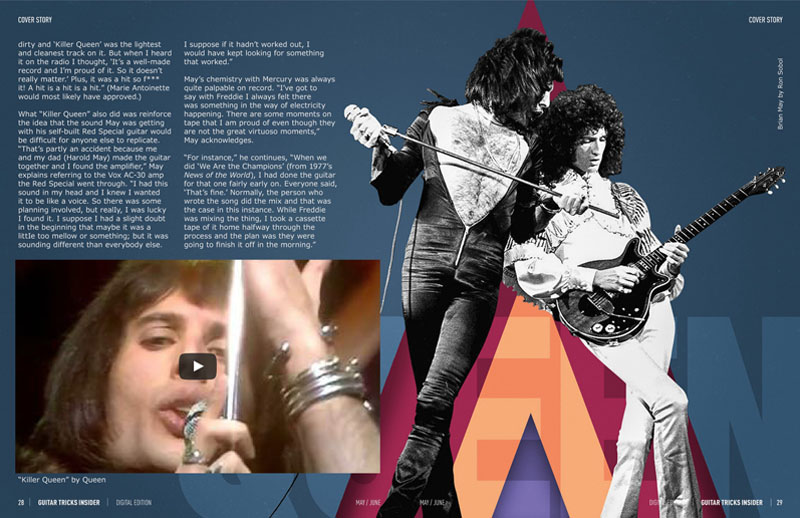Check out this wonderful article from Guitar Tricks magazine May/June 2017 issue Full acknowledgement to GUITAR TRICKS
BRIAN MAY
THE MAKING OF A STYLE by Mike Mettler
https://view.joomag.com/guitar-tricks-insider-may-june-issue/

Click for LARGER
Even the most highly successful, storied champions of the guitar can experience self-doubt all throughout their careers. Take Brian May, king of the fretboard in Queen, and the man responsible for scores of gargantuan riff in regally indelible songs like “We Are the Champions,” “Killer Queen,” “Bohemian Rhapsody,” “Tie Your Mother Down,” and “Dragon Attack.”
In fact, you might even think that May – who literally constructed his own signature sound by designing a home-built electric guitar that’s known far and wide as The Red Special and is also quite a scholarly man with a PhD in physics – would be someone who’s supremely confident about his royal prowess on the fretboard but you’d be dead wrong.
“I’m always slightly dissatisfied with the sound I’ve gotten on record, to be truthful,” May admits. “Sometimes it was close, like on ‘Fat Bottomed Girls’ [From 1978’s Jazz). In the studio I thought it was IT, in capital letters. But by the time we got it out onto a record and I heard it on the radio I thought ‘No, it’s not really there.’”
That being said, May is able to recognize when he’s done top-shelf work, such as the guitar lines he conjured for “Killer Queen,” Queen’s first truly international hit single from 1974’s Sheer Heart Attack. In this case, May’s continuously harmonic riffage expertly supports the song’s minimalist story of a high-class call girl as chronicled by the late legendary Queen vocalist/lyricist Freddie Mercury. “I totally agree with what Nuno Bettencourt has said about what you leave out is important. And Freddie was an expert at doing that,” May explains. “There’s nothing cluttered about ‘Killer Queen.’ There’s a fantastic amount going on there, but nothing ever gets in the way of anything else.” May concedes that the feel of this multi-tracked, bell-effect solo was exactly what “Killer Queen” needed to put it over the top. “I was pleased that the solo went along with it,” he agrees. “Everything is crystal clear. And when the three voices of guitars area all doing little tunes of their own, it feels almost accidental that they go together. I was very pleased with how it came out.”
While “Killer Queen” ultimately reached #2 on the British singles charts and broke the band in America, some level of doubt crept into May’s mind about whether it was the right move for Queen at a time when the band was still establishing its sonic identify. “I had reservations about the song being a single at first. I was always worried about it. Everybody thought it was the most commercial song but I was worried that people would put us in a category where they thought we were doing something ‘light’. Sheer Heart Attack was, in my mind, quite heavy and …

dirty and ‘Killer Queen’ was the lightest and cleanest track on it. But when I heard it on the radio I thought, ‘It’s a well-made record and I’m proud of it. So it doesn’t really matter.’ Plus, it was a hit so f*** it! A ht is a hit is a hit.” (Marie Antoinette would most likely have approved.)
What “Killer Queen also did was reinforce the idea that the sound May was getting with his self-built Red Special guitar would be difficult for anyone else to replicate. “That’s partly an accident because me and my dad (Harold May) made the guitar together and I found the amplifier,” May explains referring to the Vox AC-30 amp the Red Special went through. “I had this sound in my head and I knew I wanted it to be like a voice. So there was some planning involved, but really, I was lucky I found it. I suppose I had a slight doubt in the beginning that maybe it was a little too mellow or something; but it was sounding different than everybody else. I suppose if it hadn’t worked out, I would have kept looking for something that worked.”
May’s chemistry with Mercury was always quite palpable on record. “I’ve got to say with Freddie I always felt there was something in the way of electricity happening. There are some moments on tape that I am proud of even though they are not the great virtuoso moments,” May acknowledges.
“For instance,” he continues, “When we did ‘We Are the Champions’ (from 1977’s News of the World), I had done the guitar for that one fairly early on. Everyone said, ‘that’s fine.’ Normally, the person who wrote the song did the mix and that was the case in this instance. While Freddie was mixing the thing, I took a cassette tape of it home halfway through the process and the plan was they were going to finish it off in the morning.”
May quickly discovered the guitar track was not to his liking. “I thought the guitar just didn’t make it. It seemed weak in comparison to the way the song had evolved,” he observes. “I said, ‘Look, Fred, I have to get back and redo that.’ So I redid everything. There’s a little piece towards the end when I was trying to make the guitar sing along with Freddie’s vocals. He was really pushing himself on the vocals at the end, so I tried to push the guitar and express the way I felt. It’s hardly audible on the record. It’s not like a major feature, but you can hear the guitar and the vocal are kind of straining against each other. That’s the sort of thing I like to listen to now. It’s a nice moment that’s been captured there.”
Ultimately, what May’s meticulous revamping of the guitars on “We Are the Champions” shows is the keen analytical process inherent to the very core of the man’s best work alongside Mercury.
Rather than rely purely on his improv skills, to a certain degree May tended to work out his parts in advance. “In that sense, they were worked out but I wouldn’t normally sit down and write things out,” he explains. “Hopefully the only time I would get analytical was after the event. I think its best to normally…
let things happen. I had some training because of taking piano lessons and I knew what harmonies were. But if you fan get too technical about it, I think you can get a little sterile and you start doing the expected thing. Whereas if you allow yourself to be intuitive, a lot better things come out. I do know before I start playing whether I have something to say or not. But if I don’t have something to say, the best thing is to not do it and come back another day.”
Experimenting with time signatures is something that’s always grabbed May’s attention. “I’m interested in things that make up magic moments,” he agrees. “Timing-wise, (Cream drummer) Ginger Baker was fascinating because he was always doing things that sounded like they were in a particular time, but actually they were in another. Unless you listened very carefully, you would think the first beat of the bar was someplace completely different. I was always intrigued by that. In the days of Cream, Eric Clapton would also play licks that would seem to be in a different time signature to what they actually were. I always found that exciting. I suppose some of that crept into what I do, as well.”
Incidentally, those infamously layered Queen harmony parts had to be constructed one at a time. “You can’t do two notes at one time,” May explains. “When you are using the guitar in that way, it’s not a polyphonic instrument. You can only play one and get the sound, so it has to be one at a time. I think it’s good to work in sections because otherwise, you tend to forget where you’re at.”
For May, the guitar appears to be the eternal fountain of youth. “First of all, to me, the sound of the guitar is something that’s glorious, and it still has the same effect on me,” he says. “I look in the mirror and I’ve aged a lot. I find it harder and harder to hold my body together and that’s going to increase. But inside, I feel just the same as when I was 19. It’s strange but I still get excited by the sound of the guitar. I also still get excited by seeing someone else make that kind of sound. I saw Jeff Beck play recently and I got exactly the same kind of thrill and buzz watching the guy now as I did when I was a kid. That never goes away.”
After six decades of playing, recording, and listening, the guitar continues to excite May like nothing else. “There is something about the guitar that expresses anger, and passion, and frustration better than anything else,” May affirms. “No matter what age you are, you are still wrestling with your emotions, and for some reason the guitar taps that. I can’t put it any clearer in terms than that.” Brian May is a man who’s certainly paid his dues. He is a true guitar champion, my friends, and he’ll keep on riffing until the end.
—
Please visit for much more: https://www.guitartricks.com